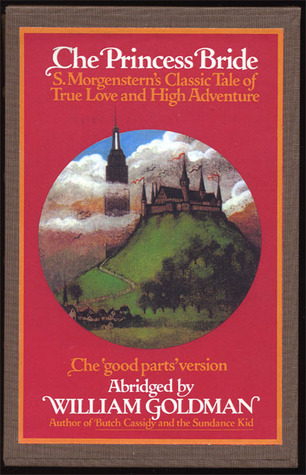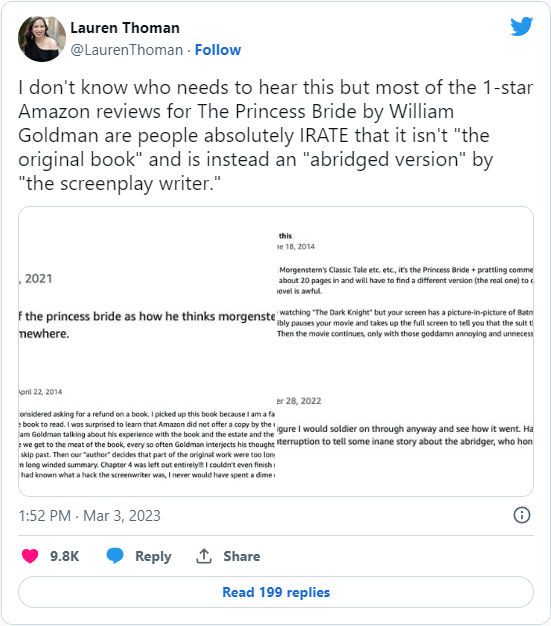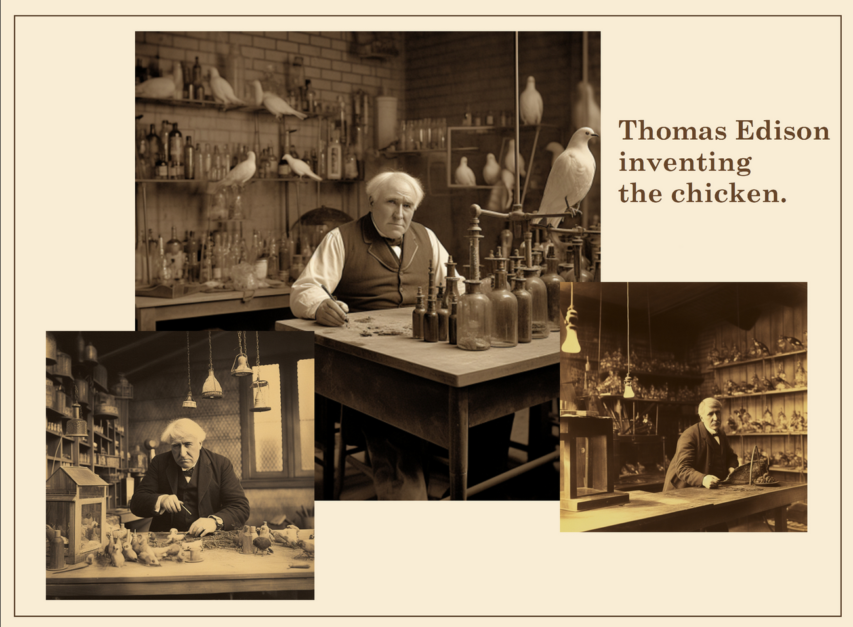NFB
Published 15 Jun 2015In this film Keaton rides across Canada on a railway scooter and, between times, rests in a specially appointed passenger coach where he and Mrs. Keaton lived during their Canadian film assignment. This film is about how Buster Keaton made a Canadian travel film, The Railrodder. In this informal study the comedian regales the film crew with anecdotes of a lifetime in show business. Excerpts from his silent slapstick films are shown
Directed by John Spotton – 1965.
July 4, 2023
Buster Keaton Rides Again (1965)
June 26, 2023
QotD: The danger to mental health in a functioning meritocracy
We need our illusions or else we could not face the world; or perhaps I should say we need illusions as a genre, if not necessarily the ones we have. There are some illusions, no doubt, that hinder us or harm us, but there are others that sustain us. Humankind, said Eliot (who used the word before it became politically correct), cannot bear very much reality — especially about itself.
The illusion that one would have been a success but for malevolent circumstance is a very necessary one for a lot of people, for there is no more pitiless or cruel a world than a pure and perfectly functioning meritocracy. Such an arrangement would confront everyone, or at least almost everyone, with his own mediocrity, for the mediocre are by definition in the majority. And who is not mediocre by comparison with Mozart? In a pure meritocracy, everyone would find his true, utterly deserved level; but it is a mere prejudice that if there were justice in the world, everyone would be better off. In a pure meritocracy, there would be no paranoid defense against one’s own nullity — one could blame only oneself for it and no one else. That is why the concept of equality of opportunity, besides implying a kind of Brave New World world, is so deeply vicious, and why so many people who promote it are obviously hate-filled. They do not want to serve humanity but torture it.
Theodore Dalrymple, “The Grand Illusion”, Taki’s Magazine, 2017-08-19.
June 25, 2023
Fifty years after The Princess Bride was published
William Goldman’s novel The Princess Bride was not a blockbuster, nor did the movie adaptation get a huge box office when it released in 1987. Yet despite apparent early mediocrity, it became a cult classic. It’s now fifty years after the book came out, and Kevin Mims has a look back at both the novel and the movie:
Even by the eccentric standards of fantasy literature, William Goldman’s 1973 novel The Princess Bride is extremely odd. The book purports to be an abridged edition of a classic adventure story written by someone named Simon Morgenstern. In a bizarre introduction (more about which in a moment), Goldman claims merely to have acted as editor. Unlike Rob Reiner’s much-loved 1987 film adaptation, the book’s full title is The Princess Bride: S. Morgenstern’s Classic Tale of True Love and High Adventure, The “Good Parts” Version. Yes, all that text actually appeared on the cover of the book’s first hardcover edition (all but the first three words have been scrubbed from the covers of most subsequent editions).
In the 1990s, I worked at a Tower Books store in Sacramento. Every few months, someone would come into the store and ask if we had an unabridged edition of S. Morgenstern’s The Princess Bride. The first time this happened, a younger colleague who had worked there longer than I had told my customer, “The Princess Bride was written by William Goldman. There is no S. Morgenstern. Goldman made him up.” The customer wasn’t convinced. “It’s metafiction,” my colleague explained. “A novel that comments on its own status as a text.” When the customer had left, my colleague told me that a lot of people still believe there is an original version of the novel available somewhere, written by Morgenstern. Having fallen in love with the story via the Hollywood film, they were now looking for the ur-text.
Although I was a big fan of William Goldman, I had never read The Princess Bride. My wife and I saw the film when it first appeared in American theaters, and we have rewatched it several times since on VHS and DVD. Only about 10 years ago did I actually get around to reading the novel. And when I did, I found myself sympathizing with all those people who still believe that, somewhere in the world, there exists an unedited edition.
In his introduction, Goldman tells us that S. Morgenstern was from the tiny European nation of Florin, located somewhere between Germany and Sweden, which is where the story’s action takes place. Such a place never existed, but it’s not surprising that many 21st-century American readers don’t know the names of every current and former European kingdom. European history is littered with microstates that rose briefly and then vanished without leaving much of a trace. Back in the 1990s, before Internet access became commonplace, confirming the existence of a small defunct European statelet would have involved a trip to the library.
But readers in the 1970s might have been more alive to Goldman’s ruse. Back then, metafiction was all the rage. John Barth became a literary superstar (among the academic set, anyway) with books like The Sot-Weed Factor (which, like The Princess Bride, is a fantastical comic adventure supposedly written by a fictional author) and Giles Goat-Boy (the text of which, Barth writes in the foreword, was said to have been written by a computer). In 1983, Goldman would publish a second novel behind the Morgenstern pseudonym, titled The Silent Gondoliers, but this time he removed all mention of himself, even from the copyright page.
QotD: We won’t be seeing any rebooted TV shows from the 1990s
… most 1990s entertainment would be impossible to “reboot” now, simply because so much of it presumes a baseline level of social and especially governmental competence. Take The X-Files, for instance. The “hot take” on the show back then was that it reflected our widespread social unease with an all-powerful government. The truth is out there!
Thirty years on, we can only dream of a government competent enough to cover up contact with extraterrestrials. As someone remarked at Z Man’s the other day, our government is now so retarded, Eric Swalwell — a high-ranking member of the House intelligence committee and putative presidential candidate — couldn’t successfully bone a hooker. Sorry, gang, the aliens won’t be stopping by; they only want to make contact with intelligent life.
Severian, “Random Thoughts”, Rotten Chestnuts, 2020-12-17.
June 19, 2023
1963: Mockumentary Predicts The Future of 1988 | Time On Our Hands | Past Predictions | BBC
BBC Archive
Published 17 Jun 2023Russian moon landings, week long traffic jams, a workforce replaced by automation and above all, too much leisure time!
These are just some of the bold predictions made in Don Haworth’s 1963 BBC “mockumentary” Time on Our Hands – a remarkable film which projects the viewer a quarter of a century into the future.
Imagine how the futuristic inhabitants of 1988 — a society freed from the shackles of endless hard work — might reflect on the way people live and work in 1963. Its aim is to look back at the extraordinary, almost unbelievable, events of the intervening 25 years — referred to as “the years of the transformation”.
“This Buoyant programme could be repeated a dozen times and still intrigue, delight and disturb me”
Dennis Potter, Daily Herald TV critic, 1963This footage is compiled of excerpts from Time On Our Hands, a faux-documentary film by Don Haworth.
Originally broadcast 19 March, 1963.
June 16, 2023
Blackadder at 40
Ed West remembers his first encounter with the brilliant, devious, and hilarious Edmund Blackadder:
What do these famous figures from British history all have in common? Elizabeth I, George III, George IV, Victoria and Albert, the Duke of Wellington, Dr Samuel Johnson, Sir Walter Raleigh, Sir Douglas Haig, Richard III, er Richard IV, William Pitt the Younger, William Pitt the Even Younger …
They’re all, of course, characters in the greatest tale of our island story, a giant rollercoaster of a comedy in four sizzling chapters, one that was first shown 40 years ago today.
I was probably always going to love history — my dad was obsessed with it — but Blackadder helped imprint the idea that the past can be one great black comedy. History is funny because people’s behaviour is often quite irrational, or spiteful, or motivated by petty reasons that contrast with their high-minded principles — and no doubt we will seem the same to future generations, too.
That was the whole idea behind Blackadder because, as creator Richard Curtis points out in a documentary screened tonight on Gold, he’s “a modern person in the stupidity of ancient times”.
Yet when the idea was first proposed by Curtis and Rowan Atkinson, they were advised that there are two sitcom premises that can never work — shows set in heaven and hell, or those in historical settings. And Blackadder was lucky to survive its first season.
Atkinson and Curtis had met at Oxford, going on to work together on Not the Nine O’Clock News, where they’d met producer John Lloyd. The two men were inspired by Fawlty Towers, but were also determined to avoid any comparison with John Cleese and Connie Booth’s great creation, so decided on a setting as far removed from a south coast hotel as possible.
Aired on 15 June, 1983, The Black Adder was quite lavish. There were location shots in places like Alnwick Castle and huge amounts spent on costumes and horses. Curtis says that one of the hats Atkinson wore was worth more than he was paid for writing the episode. It featured such big names as Brian Blessed and Peter Cook, the godfather of alternative comedy whose presence granted the show its place in the apostolic succession. But, while the first series has its moments, it was flawed; the original Blackadder was a weasel-like and pathetic figure, and less clever than his sidekick Baldrick. The comedy didn’t exactly work.
I was fortunate enough to encounter the second series, set in Elizabethan England, before I saw any of the first series. The original has its funny moments, but Ed is quite correct that it’s less than the sum of its parts. Brian Blessed steals every scene he’s in (as always), and Peter Cook’s portrayal of Richard III is great. The rest … is kinda funny if you know a bit of the history. Thankfully, there was more to come.
Blackadder II aired at the start of January 1986, and had a much smaller budget and a simpler set up — and it was far, far funnier, the protagonist no longer a conniving weasel but a court sycophant with Baldrick and Percy as comedy punchbags.
“Well, it is said, Percy, that civilised man seeks out good and intelligent company, so that through learned discourse he may rise above the savage and closer to God. Personally, however, I like to start the day with a total dickhead to remind me I’m best.”
(Fans of comedy shows who quote the lines endlessly can become quite tedious but, well, tough.)
Or: “The eyes are open, the mouth moves, but Mr. Brain has long since departed, hasn’t he, Percy?”
Towards Baldrick he is somewhat more indulgent, telling him that “Thinking is so important“.
“I’ve been in your service since I was two and a half my Lord,” his dogsbody protests upon being thrown out: “Well that is why I am so utterly sick of the sight of you.”
Elton also thought the medieval era to be too squalid and wanted Season 2 set in the “sexier” Elizabethan era (and indeed Edmund’s outfit is rather sexy, as Percy might put it).
Geography Now! Finland
Geography Now
Published 23 Nov 2016Seriously though. Do those squats bro.
(more…)
June 13, 2023
Why The Far Side is a masterclass in storytelling
The Gaze
Published 26 Dec 2019The Far Side by Gary Larson is one of the best and most praised cartoons in history. But what makes The Far Side so good? What is the legacy of Gary Larson? And most importantly: what can we learn from The Far Side?
0:00 Pixar and Storytelling
1:22 How Gary Larson tells a story
2:42 The Far Side facts and figures
3:22 The level of detail in The Far Side
4:04 Telling a story with one image and a punchline
5:09 What is The Far Side about?
7:11 Gary Larson and naturalism
7:40 Controversy over The Far Side
8:10 The legacy of The Far Side
9:00 Conclusion
(more…)
June 9, 2023
June 5, 2023
QotD: The four types of college papers for English Majors – 4. The Old Switcheroo
Only superstars write the Old Switcheroo. But if you pull this off, the sky is the limit. You might end up as a Senator or in the Cabinet, or have a prominent byline in a newspaper of record.
That’s because the Old Switcheroo turns everything into its opposite. If you master this technique, you can prove anything, no matter how implausible. Water isn’t wet. War is Peace. We have always been at war with Eastasia. You name it.
Everybody thinks that Shakespeare’s King Lear is a tragedy, but for the Old Switcheroo, you prove that it’s actually a comedy. Everybody thinks that Mozart is a great composer, but you prove that he stole everything he wrote from Salieri’s butler. Frankenstein wasn’t a monster, but a respected scientist. Etc. etc.
Up is down. Black is white. Fire is ice.
Make no mistake, the Old Switcheroo is A+ work, and no fooling. Even more, it’s a surefire path to career success. There’s just one tiny problem: The people who master the Old Switcheroo are batshit crazy and have a psychological profile dangerously close to that of a serial killer. They might end up in the White House, but you wouldn’t trust them to house-sit your chia pet.
Ted Gioia, “The 4 Types of College papers for English Majors”, The Honest Broker, 2023-02-27.
June 4, 2023
QotD: The four types of college papers for English Majors – 3. The DIM
We are now trying to impress the professor and get an A. So we can’t just write about what’s happening at the surface level — we must identify the Deep Inner Meaning (DIM) that others don’t see.
Those bozos think that Moby Dick is a novel about a great white whale. But we know there’s a Deep Inner Meaning to the book — that whale is actually a stand-in for the author’s annoying mother-in-law. Or maybe it’s a surrogate for the President of the United States. Or a displaced sex object.
Let your imagination run free. It really doesn’t matter which you choose. It just can’t be anything obvious. And then you need to talk a good game, and not pay too much attention to facts and plausibility.
And who said you don’t learn useful job skills as an English major?
If you spread the B.S. thick enough, and never let on that you even sniff the stench, you have better than even odds of getting a top grade. It helps, by the way, if you show up in class dressed in something unseemly and having omitted several steps in your morning grooming routine — which are seen as signs of incipient genius in the School of Humanities.
Ted Gioia, “The 4 Types of College papers for English Majors”, The Honest Broker, 2023-02-27.
June 3, 2023
QotD: The four types of college papers for English Majors – 2. The TWIT (They Were Idiots Then)
Back in the old days, everybody was a fool — They Were Idiots Then (TWIT).
We know that unfailingly, for the simple reason that they didn’t think like us. They were stupid and stodgy and superstitious and held all sorts of irritating views.
And it’s true. You can take absolutely any book from a hundred years ago, and find infractions on almost every page. The past is a different country, where everybody is a knucklehead.
Here’s how to write a TWIT: You take a yellow marker and highlight every time somebody in the book makes a blunder, according to our current rules of decorum this week. Trust me, you won’t even have to read the whole book. Within a chapter or two, your book will have more yellow highlights than Nicki Minaj’s hairdo.
Now you’re ready to roll.
You write up the infractions like it’s a district attorney’s indictment. But here’s the key — you must give it some fancy name. You can’t just call a twit a twit in your TWIT paper; you have to refer to your harangue as a critique or an exegesis or a deconstruction, starting with the title — which should be something like “A Critique of Phallogocentrism in Henry James’s Turn of the Screw“.
Once you get the hang of this, it’s as easy as shooting fish in a barrel. There’s just one problem — everyone else in the class is also writing TWIT papers. It’s the most popular thing on campus since the invention of the senior admin job. So you only get a B on these. Or maybe B+ if you throw in a few French words (for example, inserting différance whenever you’d normally say difference).
Ted Gioia, “The 4 Types of College papers for English Majors”, The Honest Broker, 2023-02-27.
June 2, 2023
QotD: The four types of college papers for English Majors – 1. The Reliable C&C
This is the “compare and contrast” paper, and is about as simple as they come. You take two things that aren’t exactly like each other. It’s just like Sesame Street, but with books.
Then you list 5 ways they are similar and 5 ways they are different. Voilá — you’ve written a college paper!
Ernest Hemingway and Jane Austen are both writers who share the same language: English. But Hemingway is an American who liked bullfighting and drinking martinis. Jane Austen is English and never fought a bull. She probably drank tea, because the martini wasn’t invented until 1863, some 47 years after her death …
You can write this stuff in your sleep, provided you dream about Wikipedia entries. But be forewarned: the reliable C&C probably only gets you a reliable C grade.
Ted Gioia, “The 4 Types of College papers for English Majors”, The Honest Broker, 2023-02-27.
May 30, 2023
QotD: The technical flaws of modern cameras
The camera, it is said, does not lie, but when it comes to me it not only lies but is a pathological liar, incapable of telling the truth. Who is that creature it takes when pointed at me? Certainly not I: Every camera in the world, it seems, has been programmed to make me balder, whiter-haired, more wrinkled than I am. Who has done this, or why, I cannot say, but the evidence is plain for me, if not for anyone else, to see.
Theodore Dalrymple, “The Grand Illusion”, Taki’s Magazine, 2017-08-19.
May 25, 2023
The greatest economic moment of the 20th Century was when Thomas Edison invented the chicken
What’s that, you say? Edison didn’t invent the chicken? Yes, yes, okay. Technically it wasn’t Edison and technically the chicken already existed long before then, but Robert Graboyes explains why it’s kinda true:
No, Thomas Edison didn’t invent the chicken, despite my fake, AI-generated photographs above. But around the time of the Apollo moon landings, a future Nobel laureate allegedly declared that the most important invention of the 20th century was the chicken. This cryptic statement offers profound wisdom about possible paths of healthcare innovation in the 21st century. The chicken quote was attributed to Robert Mundell, 1999 Nobel economist, by Dick Zecher, who was my boss at Chase Manhattan Bank and, before that, Mundell’s colleague at the University of Chicago.
How is the chicken — first domesticated more than 5,000 years ago — a 20th-century invention at all? And how was the chicken more important than the airplane, computer, atomic bomb, television, interplanetary rocket — or the countless works of Edison and his crew?
Dick told me that the comment, delivered during an Economics Department seminar, attracted the blank stares that often met Mundell’s odd, enigmatic, and always-profound observations. After a prolonged silence, the befuddled seminar speaker asked what Mundell meant.
His insight was that in the 20th century, modern production methods so drastically reduced the price of chicken that the bird became, for all practical purposes, an entirely new good. According to W. Michael Cox and Richard Alm (“Myths Of Rich And Poor: Why We’re Better Off Than We Think“), a typical American in 1900 worked 160 minutes to earn enough money for a 3-pound chicken. An equivalent worker in 2000 needed only 14 minutes of wages to buy that chicken. Pre-1950s, consumers generally had to eviscerate a commercially bought bird or have a butcher do it. (My mother used to shudder when she recalled the itinerant butcher who would slaughter chickens for my grandmother in their kitchen sink.) Herbert Hoover’s promise of “a chicken in every pot” rings dull to our ears, but in 1928, the phrase sounded like “a flying car in every garage” sounds to ours.
Revolutionary production, distribution and storage methods changed chicken from a Sunday luxury item to the everyman’s protein. Our concept of chicken bears little resemblance to our great-grandparents’ image. Massive reductions in food prices explain why rates of malnutrition and starvation have plummeted worldwide since the mid-20th century.







